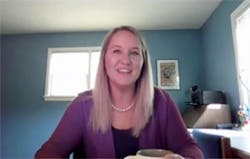“Throughout the pandemic, issues related to equity, diversity and inclusion have been amplified.” Madison Anderson, diversity and inclusion program manager at Rockwell Automation, moderated a panel discussion on how the pandemic has changed the way we work, the new challenges of being an inclusive leader in changing times, and what Rockwell Automation leaders have learned along the way.
“Throughout the pandemic, issues related to equity, diversity and inclusion have been amplified,” said Madison Anderson, diversity and inclusion program manager at Rockwell Automation. At this week’s Automation Fair At Home event, she led a discussion on this topic and others with her colleagues, Rachael Conrad, vice president and general manager of Rockwell Automation’s Services Business; Eric Chalengeas, regional sales director for EMEA South Region; and Gustavo Zecharies, director of market access for Rockwell’s Latin American region. The session “Inclusive Leadership During the Time of the Pandemic,” explored how the pandemic has changed the way we work, the new challenges of being an inclusive leader in changing times, and what Rockwell leaders have learned along the way.
The challenges during the pandemic have also changed for leaders as the situation progressed—from safety to remaining productive to the long-term implications. In the beginning, “What I really thought about is ‘I’m not in this alone,’” Conrad said. “There is no playbook, so we have to figure out how to act and how to work. We acted fast but not impulsively. We had contingency plans for contingency plans, so really thinking about resiliency. I think we acknowledged what we couldn’t control and found new ways to connect and work and recognize great work, too.”
“From a business perspective, one thing that was worrisome in the midst of the first days of this pandemic was our ability to react,” Zecharies said. “Looking back, I think it will be one of the things we remember and are proud of: how agile the company has been to adopt these news ways of working.”
Remote working situations have only magnified the need for inclusive leadership and fostering new environments where workers can be productive and connect with their coworkers in different ways. “We know companies and organizations can’t add diversity to the mix of a team and expect that people will automatically collaborate, connect, resolve conflicts or innovate as a cohesive unit,” Anderson said, and asked the panelists to highlight key attributes or behaviors of inclusive leadership that have helped them.
Chalengeas highlighted humility. “I’ve learned to lead with humility. For me, that means, I don’t know everything. I need to ask questions. I need to gather feedback, to be empathetic,” he said. “It’s only by pausing, by listening to concerns that we can see the overall picture of the reality around us, because we see it from a very biased point of view.”
Conrad highlighted an important difference between equality and equity. “One of the early learnings I had in my own leadership path was recognizing that equality and equity are not the same,” she said. While it’s not necessarily wrong to want to treat everyone equally, equity is the important part for leaders, she said.
Inclusive leaders also need to be aware of biases and understand how their own perceptions might frame their reality, the reality of others or of work situations. COVID-19 has forced some into difficult work-from-home situations, and many leaders should and are recognizing those difficulties. Zecharies also sees some positive changes in attitudes about remote work in general. Previous to the pandemic, it might have been harder for remote workers to have the same presence as those in the office. “For those in remote situations, it’s difficult to have the same impact, whenever decisions are made or when presentations are made, whatever things are discussed,” Zecharies said. “That made it difficult to have an inclusive environment.” Now, the requirements of working remotely have leveled that playing field a bit. “Being in an office is not that material anymore, and we have an opportunity right now for everyone to bring their voice pretty much to the same level. It may be weird, but I feel this has actually brought a more inclusive environment.”
The pandemic has also given a louder voice to equity and diversity in the workplace and beyond. Zecharies said recently more companies are examining social issues, diversity in their workplace and worldwide, and their own biases about productivity and work/life balance. He said that seeing senior leaders speak out publicly about the nationwide social issues and unrest, to say “we condemn this situation, we are promoting space where everybody can do their best work, and that kind of behavior we don’t want to happen inside the walls of Rockwell Automation” was an important shift for the corporation in its “role as moral compass.”
Also, prior to COVID-19, “productivity,” Zecharies said, was “corporate wanting us to do more with less.” However, he said because of the challenges faced through the pandemic, “the concept of personal productivity, as opposed to corporate, is gaining traction. People are much more sensitive to the way we’re spending time.” Now that vast workforces are at home working productively remotely, their level of tolerance for the office culture may have changed. “This is something we should recognize,” Zecharies said. The generations of people and the talent that Rockwell wants to attract past this pandemic situation may be sensitive about their time at home and work/life personal balance. “As a company that is based on keeping and acquiring the best talent available, we ought to be very vigilant about this area too,” Zecharies said.
The editors of Control, Control Design and Smart Industry are providing coverage of Automation Fair At Home, bringing you breaking news, innovations and insights from the virtual event. Once Automation Fair At Home is over, the editors will put together an event report featuring the top news. Pre-order your copy today.






